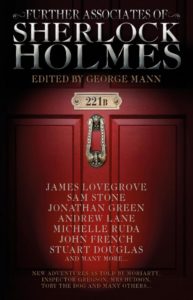Book review: George Mann (ed.): Further Associates of Sherlock Holmes
 I love short story collections. Conan Doyle was better at short stories than at most other things, and Holmes, in my view, tends to work best in a short story. I love short stories more than any other form of pastiche and I’m always happy to review them. They don’t cross my desk very often because short stories need to go in collections and those are hard to make and hard to sell. As such, I was delighted to be offered an advance copy of this collection from Titan.
I love short story collections. Conan Doyle was better at short stories than at most other things, and Holmes, in my view, tends to work best in a short story. I love short stories more than any other form of pastiche and I’m always happy to review them. They don’t cross my desk very often because short stories need to go in collections and those are hard to make and hard to sell. As such, I was delighted to be offered an advance copy of this collection from Titan.
Collections, in my view, work best when there’s a common thread to the stories that ties the collection together. For this one, all the authors were asked to write a Holmes story from the perspective of a character who isn’t Holmes or Watson (with the exception of the one story that actually is a Watson story).
The quality of the stories is solid across the board and I feel as though everyone involved had fun writing their story and putting their very own spin on Holmes and his world. All authors were also given a page as a foreword to explain why they picked the character they picked and what aspects of the canon or Holmes’ character they wanted to explore with their stories. This gives the stories some context.
There is a nice mix of approaches to character and canon because the authors have been chosen for variety – there’s everything here from film script and comic book writers to those who normally work in different genres such as fantasy or thriller, to established Holmes pastiche authors. As a result, there’s something here for everyone, though you’re likely to get more out of the collection if you have at least a passing familiarity with the canon (or are near a computer with an internet connection).
Stephen Henry’s “The Last Visitor”, a Moriarty monologue, is a suitably chilling opener. Dan Watters’ “The Docklands Murder”, a story with Wiggins as the narrator, has a sure-footed command of voice and great insight into the street urchins’ world – one rather different from Holmes’. Marcia Wilson’s “The Case of the Blind Man‘s Spectacles” gives us Gregson and a fast-paced whodunit-meets-action story that could be an episode of Ripper Street except it’s more fun, while Andrew Lane’s “The Unexpected Death of the Martian Ambassador” puts Lord Holdhurst at the centre of an extremely entertaining diplomatic encounter which may or may not be a parlour trick. David Marcum chose Jim Smith, son of Mordecai Smith, for his sobering story “No Good Deed”. Sam Stone, in “The Curse of the Blue Diamond”, gives us Watson on a medical investigation that turns into a criminal one, and Stuart Douglas’ “The Pilot Fish” gives us the origin story of Fred Porlock, one of the more obscure canon characters. Michelle Ruda delves into Violet de Merville and some grisly child disappearances at a boarding school in “Harlingdon’s Heir” and Philip Purser-Hallard, closing out the collection, has a fascinating look at Lucy Hebron’s later life in “The Second Mask”.
The stories that stand out to me personally are these:
– Iain McLaughlin’s “The Unfortunate Guest”, told from the point of view of Peterson, the commissionaire from “The Blue Carbuncle”. It gets into one of the uncomfortable truths about Holmes: that he cares more about puzzles than about people and has a real blind spot when it comes to putting other people’s lives and livelihoods on the line by leaving them in the dark about his exploits.
– Mark A. Latham’s “The Curious Case of the Vanished Youth”, which deserves an honourable mention for being written from the perspective of Langdale Pike and for being expressly about gay culture in the Victorian age. A Holmes pastiche with a sensitive portrayal of gay men, told from the perspective of an extremely likeable gay man, in which no queer characters die, in a mainstream anthology. This sort of thing shouldn’t be as rare as it is. It’s also a cracking story.
– Nik Vincent’s “The Case of the Scented Lady”, which is written from Mrs. Hudson’s viewpoint and which will make you want to punch Holmes in the face by the end if you’re anything like me.
– James Lovegrove’s “The Noble Burglar”, which is written from the perspective of Toby the sniffer dog. Anyone who tries a literary experiment of this sort deserves credit just for effort, and Lovegrove pulls it off deftly and entertainingly.
There’s one story that I liked rather less well – Jonathan Green’s “Sherlock Holmes and the Beast of Bodmin” manages to be both racist and misogynist in a way that would be just about understandable if not forgivable in an author writing in the 1800s, but certainly isn’t now. It’s a shame because it has the potential of a good adventure story.
On the whole, it’s a solid collection of stories all with their unique flavour. I read it fairly quickly but you may want to space it out to savour them. There are 14 stories in total so it‘s not quite enough for an advent calendar. I’d recommend it for anyone who likes Holmes and short stories and enjoys it when people do a bit of a different take on literary idols.
You can purchase the book at your local bookshop or at Amazon UK, Amazon US, or Hive.
A review copy was kindly provided by Titan Books.

Ardy is thirtysomething. Librarian. Transplanted German. Anglophile. Lover of tea and scones (and, yes, jam. I also own ridiculous jumpers).